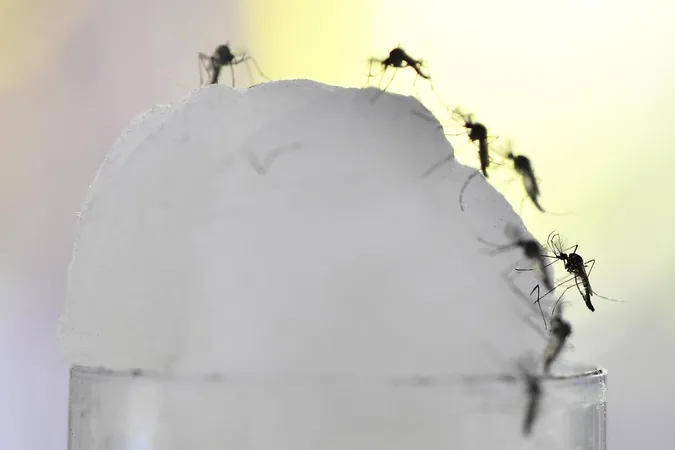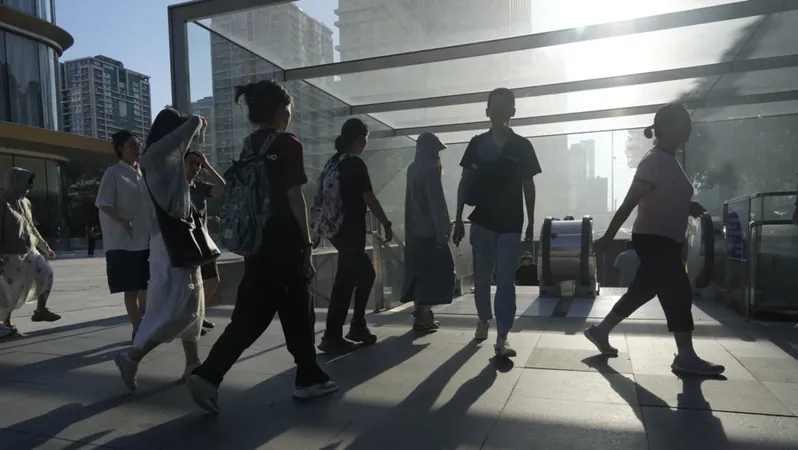
Wetter and Warmer: The Alarming Link Between Climate Change and Rising Dengue Cases
2025-01-17
Author: Ming
SINGAPORE – The year 2024 has been marked as one of Singapore's wettest and warmest years on record, with total rainfall exceeding the long-term average by an alarming 8.1%. This weather pattern has raised serious concerns as Singapore braces for a second monsoon surge expected from January 17 to 19, 2025, right after being battered by incessant rain from January 10 to 13.
According to Singapore’s third national climate change study, stormy weather conditions are projected to increase in both frequency and intensity in the coming years. Unfortunately, the troubling reality of our changing climate is that it is creating more favorable breeding conditions for mosquitoes, specifically the Aedes aegypti mosquito, which is known to transmit dengue fever.
In 2024 alone, Singapore recorded over 13,600 dengue cases, representing a staggering 36% increase from the previous year. This rise is part of a larger trend; dengue cases in Singapore have been climbing steadily since the 1990s, with the most significant outbreaks occurring in 2020 and 2022, as highlighted by the National Environment Agency.
Globally, the relationship between climate change and dengue transmission is becoming increasingly alarming. In 2023, the World Health Organization (WHO) reported over five million cases of dengue, but the outlook worsened drastically in 2024, with a shocking tally of over 14 million cases worldwide, according to the European Centre for Disease Prevention and Control.
Understanding the Climate-Dengue Nexus
1. How Climate Change Alters Dengue Dynamics
With the planet becoming both warmer and wetter, traditional hotspots for dengue—tropical and sub-tropical regions—are witnessing alarming spikes in cases. However, the repercussions of climate change are transcending geographical boundaries, with temperate regions like North America and Europe now facing dengue's encroachment.
In 2023, the European Economic Area reported 130 dengue cases, up from 71 the previous year. This increase is unexpected compared to the mere 73 cases reported in 2020 and 2021. Experts, including Dr. Ooi Eng Eong from Duke-NUS Medical School, highlight that warmer temperatures extend the reproductive window for mosquitoes, allowing for prolonged transmission periods that could now span the year.
Each degree of global warming allows the atmosphere to hold and release 7% more water, increasing the frequency and intensity of rainfall—perfect conditions for mosquito breeding, as three out of the four stages of a mosquito's lifecycle occur in water.
2. The Virus Lifecycle Under Warmer Conditions
Elevated temperatures also hasten the maturation of both mosquitoes and the dengue virus itself. Research shows that warmer temperatures enable the dengue virus to replicate more rapidly within its mosquito vectors. Following a blood meal, the virus can move to a mosquito's salivary glands in a mere 8 to 12 days, a process made more efficient by higher temperatures.
3. Challenges in Controlling Dengue Spread
Singapore has been active in controlling the Aedes aegypti population since the official vector control program started in 1970. While initial efforts led to a significant decrease in outbreaks, the issue has resurfaced since the 1990s with repeated outbreaks. This is partly due to decreasing herd immunity, as successful vector control has led to a lowered overall population immunity to dengue.
The vaccines available, such as Dengvaxia and Qdenga, pose challenges due to the need for precise targeting of four genetically distinct serotypes of the dengue virus. Currently, Dengvaxia is approved in Singapore for individuals aged 12 to 45 with prior dengue infections.
Looking Ahead: A Multifaceted Approach Needed
In the face of these mounting challenges, experts suggest the implementation of a multifaceted strategy in managing dengue risk. Dr. Kimberly Fornace advocates for robust diagnostic and treatment protocols, alongside vaccination strategies and enhanced public education. Dr. Ooi emphasizes the continuation of vector control measures while adapting to the evolving landscape shaped by climate change.
As climate change continues to reshape our world, vigilance and proactive measures will be critical to shielding vulnerable populations from the ever-present threat of dengue fever. The alarming uptick in cases serves as a stark reminder that climate action is not just an environmental concern, but a public health imperative.



 Brasil (PT)
Brasil (PT)
 Canada (EN)
Canada (EN)
 Chile (ES)
Chile (ES)
 Česko (CS)
Česko (CS)
 대한민국 (KO)
대한민국 (KO)
 España (ES)
España (ES)
 France (FR)
France (FR)
 Hong Kong (EN)
Hong Kong (EN)
 Italia (IT)
Italia (IT)
 日本 (JA)
日本 (JA)
 Magyarország (HU)
Magyarország (HU)
 Norge (NO)
Norge (NO)
 Polska (PL)
Polska (PL)
 Schweiz (DE)
Schweiz (DE)
 Singapore (EN)
Singapore (EN)
 Sverige (SV)
Sverige (SV)
 Suomi (FI)
Suomi (FI)
 Türkiye (TR)
Türkiye (TR)
 الإمارات العربية المتحدة (AR)
الإمارات العربية المتحدة (AR)